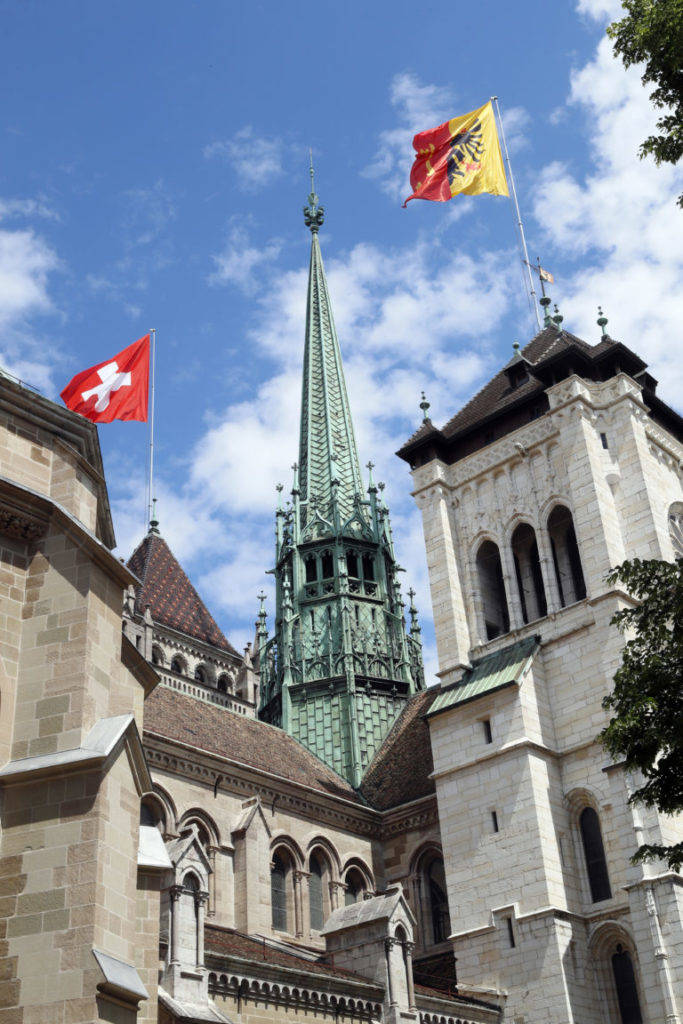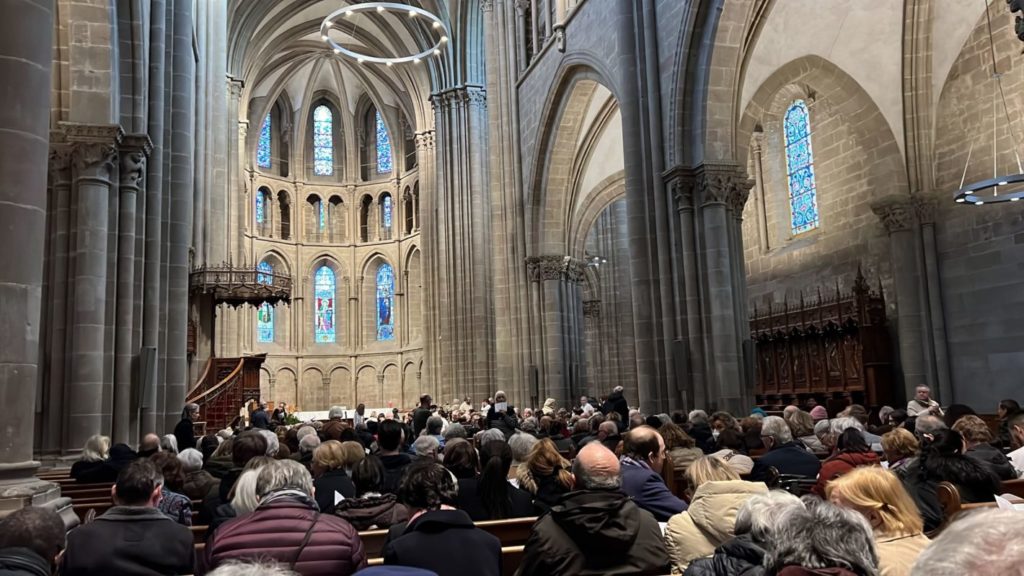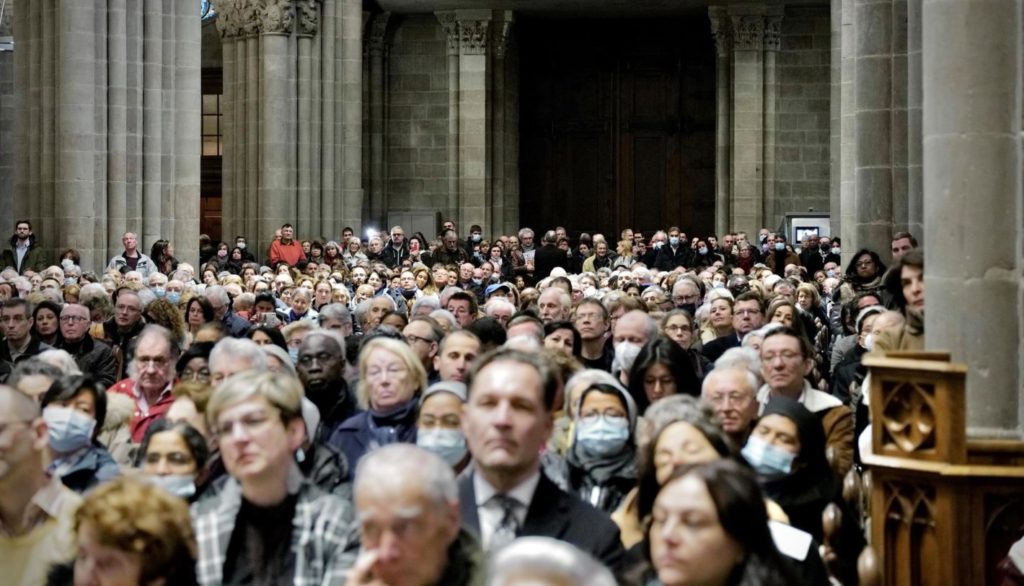Last Saturday, March 5, at 6 p.m., in the heart of a Europe shaken by the war in Ukraine, a flame was lit for peace among Christians. It is not a minor event, nor an ephemeral episode: the cathedral of Geneva, which with the Calvinist reform had excluded Catholic worship from its walls almost five centuries ago, welcomed the Holy Mass for the first time. The exalted rhetoric echoed in one of the inscriptions still engraved on the walls of the church today: "In the year 1535, the tyranny of the Roman antichrist having been overthrown and superstition abolished, the Holy religion of Christ has been restored in its purity...". In fact, the last Mass celebrated in the cathedral, in the summer of that year, had ended with riots, expulsion of the clergy, and destruction and pillage of the statues and objects of worship, symbols of "idolatry". A scenario at the antipodes of the cordiality with which Calvinists and Catholics would meet, under those same vaults, at the turn of the centuries. Not any time in the past was better.

How did it come to this? Although many generations have had to pass to appease tempers and bring positions closer together, the origin of the story that leads to this celebration goes back a few years: a terrace conversation between Pascal Desthieux, then pastor of a church in Geneva, and Emmanuel Rolland, a Reformed pastor. Desthieux was telling his friend about the Mass that has been celebrated annually since 2004 in Lausanne, the second largest city in French-speaking Switzerland, whose cathedral is also in the hands of a Reformed church. Like someone who has an idea (une boutade), Desthieux added: "Of course, if something like that happens in Geneva, it is not for the day after tomorrow...". It is true: the symbolic burden of hosting a Mass in the cathedral would be much stronger in this city, the world center of Calvinism, the Protestant denomination with the greatest international influence. The conversation then went on in a different direction, but the challenge was already served. Certainly, the thing was not for two days later, but it was for a few years later, when Rolland contacted Desthieux with the news that, in his opinion, the times were ripe.
After a series of consultations and deliberations, the consistory of the Protestant Church would approve the celebration of this first Eucharist for February 29, 2020. Already Omnes had reported this then imminent event.The event was cancelled just over 24 hours earlier due to the outbreak of the Covid pandemic and the restrictions imposed at the time on large gatherings. The celebration was postponed twice more, and was only able to take place almost exactly two years later, when the restrictions due to the pandemic were lifted.
In the choice of this new date, the choice of the precise moment of the liturgical year was maintained: the eve of the first Sunday of Lent. Still in the wake of Ash Wednesday, the Saturday celebration took up the rite of the beginning of Lent, a sign in which the Reformed faithful present were also invited to participate. This was intended to signify that it was not only a festive event, but also a penitential process. Catholics and Protestants wanted to ask forgiveness for their respective excesses and faults against unity in the past. In the same vein, the concelebrants recited the first Eucharistic prayer of Reconciliation, with excerpts in Portuguese, Italian and Spanish, perhaps the languages most represented among the faithful, in addition to French.
Already in the first words that Daniel Pilly, president of the Cathedral's parish council, addressed to the assembly, the contrast between the tumult of that last Mass five centuries ago and the cordiality of this first one stood out. In issuing this invitation to Catholics, Pilly began, the council was conscious of "creating an event with a very strong symbolic charge" that highlights the reality of "fruitful ecumenical cooperation over many years" and the development of "mutual trust" between Catholics and Protestants. "The celebration of a Mass at the turn of 486 years - continued Pilly - is a significant gesture. Today we are happy to be able to take this step".

As was to be expected, Abbé Pascal Desthieux himself presided at the Eucharist, accompanied by about twenty concelebrating priests and several deacons. Although he had the modesty and the historical sense not to put himself at the center with his words, it is obvious that seeing it become a reality also means finir en beauté his ministry as episcopal vicar of the diocese for the canton of Geneva. "Your invitation, which we accept humbly and with much gratitude," Desthieux replied to the parish council of the Cathedral, "has great significance for us, and has aroused great enthusiasm, as shown by the impressive number of faithful gathered here."
Desthieux also asked for prayers for the conflict in Ukraine. He noted with emotion that among the faithful who crowded the church was a Ukrainian woman recently arrived in Geneva, fleeing the conflict; and, among the concelebrants, a Ukrainian priest, Sviatoslav Horetskyi, who has been responsible for the faithful of the Greek-Catholic rite in Geneva and Lausanne for the past few months.
It is to be hoped that this Eucharist in the cathedral will not be limited to an isolated event. At least that is what the words with which Pilly ended his welcoming address seem to imply: "We also want to show that this cathedral is a meeting place for all the Christians of Geneva. What unites us is the Gospel, and the Gospel is stronger than all the traditions that separate us. And that in no way prevents each of us from keeping our own identity. Such a celebration, he added, necessarily takes place "in communion with all the Christians who have prayed here during the 1500 years of Geneva's Christian history. Without their faith, we would not be here today.
Geneva, Switzerland









